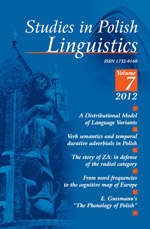Raz jeszcze o relacji między polskim aspektem niedokonanym i francuskim imperfectum w ramach Gramatyki Rozproszonej (franc. grammaire repartie)
Revisiting the correspondence between the Polish Imperfective Aspect and the French Imparfait in the Distributed Grammar (DG) framework
Author(s): Hélène Włodarczyk, Aleksandra WalkiewiczSubject(s): Language and Literature Studies
Published by: Wydawnictwo Uniwersytetu Jagiellońskiego
Keywords: verbal aspect; imperfective; semantics; pragmatics; MIC theory
Summary/Abstract: The present paper is an attempt to apply the Distributed Grammar (DG) theory which includes both the semantic and the pragmatic (meta-informative) level, to a cross-linguistic, comparative analysis of the use of certain aspect forms in Polish and French. Although the opposition of simple and complex forms of the French verb is often interpreted as aspectual, the existence of aspect in French usually taken for granted, and the Imparfait tense (IMP) described as “imperfective”, we propose to revisit the correspondence of IMP and the past forms of Polish Imperfective (IPF) verbs. We shall look particularly closely at cases where the IMP is not a translation equivalent of the Polish IPF, trying to explain these differences referring to both systemic and contextual factors. By reference to the theory of Meta-informative Grounding (MIG), we explain the corresponding uses of the IMP and the IPF by the ontological grounding of situations considered as generic, general, potential or habitual. The other uses of the IPF which do not correspond to the IMP in French can be explained by what we call cognitive and communicative grounding, in other words by the fact that the situation is pictured as known to both the speaker and the hearer or as already mentioned (anaphoric usage). Some other non-corresponding uses of the IPF result from its unmarked character in the Slavic Aspect opposition. Such uses of the IPF (which we call neutral) are motivated by the speaker’s intention to (1) “avoid” a specific meaning carried out by the Perfective (PF), or (2) state nothing but the simple occurring of a situation, or (3) underline the fact that the speaker was certainly not involved in the situation described by the verb.
Journal: Studies in Polish Linguistics
- Issue Year: 7/2012
- Issue No: 1
- Page Range: 5-36
- Page Count: 32
- Language: English

